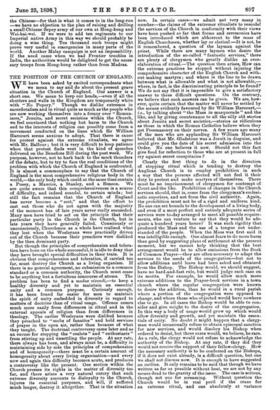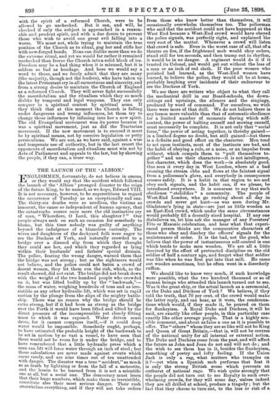THE POSITION OF THE CHURCH OF ENGLAND.
WE have been asked by excited correspondents what we mean to say and do about the present grave situation in the Church of England. Our answer is a short one. We mean to keep our heads,—even if all the shutters and walls in the Kingdom are temporarily white with " No Popery." Though we dislike extremes in sacerdotalism and in ritual quite as much as the people who are now working themselves into a frenzy over " Roman- isers," Jesuits, and secret societies within the Church, we feel convinced that nothing but harm to the Church and to the interests of religion can possibly come from a movement conducted on the lines which Sir William Harcourt seems anxious to adopt. That there is cause for protest against the extreme ritualists, we agree with Mr. Balfour ; but it is very difficult to keep patience when that protest finds vent in the kind of speeches delivered on the Benefices Bill during the past week. We purpose, however, not to hark back to the mock thunders of the debate, but to try to face the real conditions of the problem with which the Church of England is confronted. It is almost a commonplace to say that the Church of England is the most comprehensive religious body in the world,—the only body which could at the same time contain a Pusey, a Maurice, a Stanley, and a Simeon. We are quite aware that this comprehensiveness is a source of difficulty, and indeed scandal, to certain minds ; but still the fact remains that the Church of England has never become a " sect," and that the effort to cast out those who do not agree with the majority of the moment has of late years never really succeeded. Many men have tried to act on the principle that their particular party in the Church is the Church, but in late years they have generally failed. Consciously or unconsciously, Churchmen as a whole have realised what they lost when the Wesleyans were practically driven out of the Church because their preachers were disliked by the then dominant party. But though the principles of comprehension and tolera- tion have been on the whole successful, it is idle to deny that they have brought special difficulties in their train. It is obvious that comprehension and toleration, if carried too far, must destroy the Church as a living organism. If there is no general agreement, no submission to a common standard or a common authority, the Church must cease to be anything but a fortuitous concourse of atoms. The problem has been to find a modus vivendi,—to keep a healthy diversity and yet to maintain an essential unity and a common purpose. Curiously enough, it has been found far easier for men to maintain the spirit of unity embedded in diversity in regard to matters of doctrine than of ritual usage. Offence comes much more easily from differences in ritual and in the external appeals of religion than from differences in theology. The earlier Wesleyans were disliked because they preached to " mobs of fanatics" and held services of prayer in the open air, rather than because of what they taught. The doctrinal controversy came later and as an excuse for stopping the " zealots " and " enthusiasts " from stirring up and unsettling the people. At any rate, there always has been, and always must be, a difficulty in maintaining side by side the principles of comprehension and of homogeneity—there must be a certain amount of homogeneity about every living organisation—and every now and again this difficulty becomes acute, and produces a controversy like the present. One section within the Church presses its rights in the matter of diversity too far, and there arises a very natural outcry that such extreme diversity amounts to disloyalty to the Church, injures its essential purposes, and will, if suffered much longer, destroy it altogether. That is the situation now. In certain cases—we admit not very many in number—the claims of the extremer ritualists to remodel the services of the Church in conformity with their views have been pushed so far that forms and ceremonies have been introduced which are abhorrent to the mass of English Churchmen, whether lay or clerical.—It is not, be it remembered, a question of the layman against the priest. While there are many laymen who desire the introduction of the so-called " fantastic services," there are plenty of clergymen who greatly dislike an over- elaboration of ritual.—The question then arises, How can the extreme practices be stopped without injuring the comprehensive character of the English Church and with- out making martyrs ; and where is the line to be drawn between what is allowable and what is not allowable,— where, in fact, is the discriminating principle to be found? We do not say that it is impossible to give a satisfactory answer to these difficult questions. On the contrary, we believe that such answers can be given. We are, how- ever, quite certain that the matter will never be settled by the means evidently favoured by Sir William Harcourt, — i.e. , by talking about " the Mass in masquerade " and the like, and by giving countenance to all the silly old stories about Jesuits and secret societies,—stories as ridiculous as those in which the Roman Catholics believe when they get Freemasonry on their nerves. A few years ago many of the men who are applauding Sir William Harcourt believed that Mr. Gladstone was a Jesuit in disguise, and could give you the date of his secret admission into the Order. No one believes it now. Should not this fact give food for reflection to those who are at present in full cry against secret conspiracies ?
Clearly the first thing to do in the direction of stopping ritual which is tending to destroy the Anglican Church is to employ prohibition in such a way that the persons affected will not feel it their duty to protest and make martyrs of themselves. There must be no imprisonment of clergymen for contempt of Court and the like. Prohibition of changes in the Church services should, that is, come from the clergyman's ecclesi- astic superiors, and not from the civil authority. Again, the prohibition must not be of a rigid and uniform kind. No one can set bounds to the development of a living body, and even if a most perfect and entirely adequate series of services were to-day arranged to meet all possible require- ments, who can venture to say that they would be ade- quate a hundred years hence? It was such rigidity that produced the Mass and the use of a tongue not under- standed of the people. When the Mass was first said it was intelligible enough. One almost fears to do more harm than good by suggesting plans of settlement at the present moment, but we cannot help thinking that the best arrangement would be to allow omissions from the Book of Common Prayer—they are often necessary to adapt the services to the needs of the congregation—but not to allow additions until leave had been asked and obtained from the Bishop. The Bishop would, we should suggest, have no hard-and-fast rule, but would judge each case on its merits. For example, he would allow much more extreme additions to the Prayer-book services in a town church where the regular congregation were known to desire the addition, than he would in a rural parish where a portion of the congregation were opposed to change, and where those who objected would have nowhere else to go. In all cases the Bishop would be able to con- sider and give weight to the desire of the congregation. In this way a body of usage would grow up which would allow diversity and growth, and yet maintain the essen- tials of unity. No doubt it might happen that a clergy- man would occasionally refuse to obtain episcopal sanction for new services, and would disobey his Bishop when ordered to desist, but these cases would, we believe, be rare. As a rule, the clergy would not refuse to acknowledge the authority of the Bishop. At any rate, if they did they would not receive the support of their fellow-clergy. How the necessary authority is to be conferred on the Bishops, if it does not exist already, is a difficult question, but one we shall not discuss now. It is enough to have suggested an outline. It only remains to be said that though we have written as far as possible without heat, we are not by any means dead to the gravity of the issue. The case is serious, though not one for screaming. Without question the Church would be in real peril if the craze for an extreme ritual, and one absolutely at variance with the spirit of a reformed Church, were to be allowed to go unchecked. But it can, and will, be checked if only the subject is approached in a reason- able and prudent spirit, and with a due desire to prevent those who wish to avoid one great evil falling into a worse. We must not, while trying to maintain the true position of the Church as to ritual, gag her and stifle her with new-forged bonds. None can dislike more than we do the extreme ritual, and yet we would far rather it remained unchecked than freeze the Church into a solid block of ice. Freedom may be a bad thing when it is misused, but it is seldom so bad as bondage. And here we would say a word to those, and we freely admit that they are many (the majority, though not the leaders), who have taken up the latest Protestant cry in all earnestness and sincerity, and from a strong desire to maintain the Church of England as a reformed Church. They will never fight successfully the sacerdotalism and the ritualism which they so much dislike by temporal and legal weapons. They can only conquer in a spiritual contest by spiritual arms. If they think that at this moment the Church is falling under dangerous and wrong influences, let them try to change those influences by infusing into her a new spirit. The old Evangelical movement won its power because it was a spiritual movement, just as did. the Tractarian movement. If the new movement is to succeed it must be by spiritual means, not by coercive legislation or petty persecutions. We are not, as we have said, against a wise and temperate use of authority, but in the last resort the opponents of sacerdotalism and ritualism must win not by Acts of Parliament and appeals to the law, but by showing the people, if they can, a truer way.



















































 Previous page
Previous page